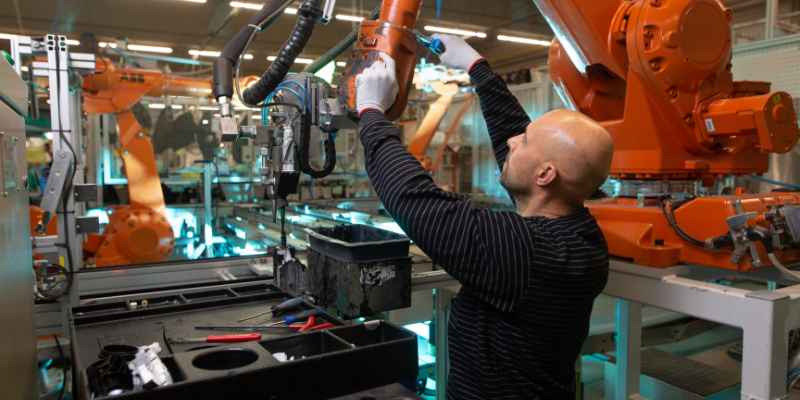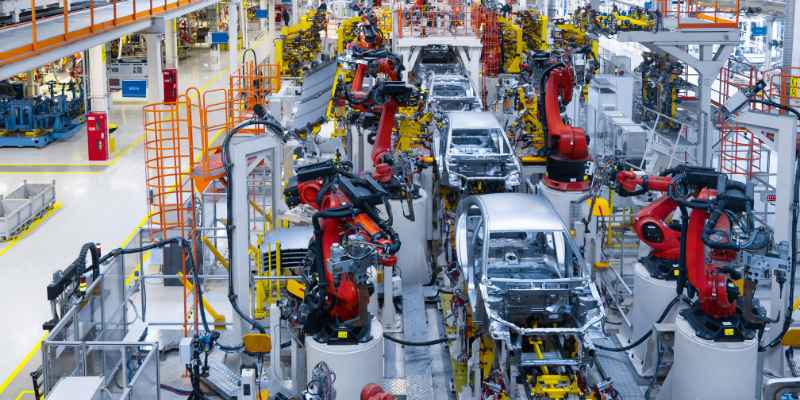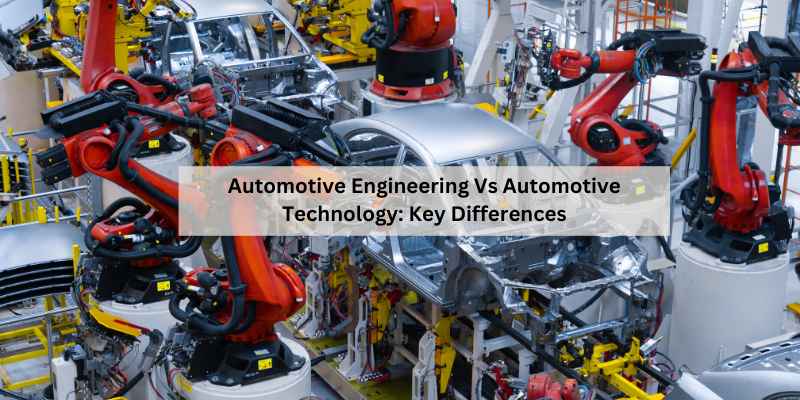Automotive Engineering Vs Automotive Technology: Key Differences
Automotive Engineering deals with designing and manufacturing automotive components. Automotive Technology specializes in hands-on repair and maintenance of vehicles.
Both fields play crucial roles in the automotive industry, with engineers focusing on innovation and technology advancements, while technicians work on practical applications and troubleshooting. Automotive Engineering involves in-depth research, development, and testing of automotive systems, whereas Automotive Technology emphasizes practical skills and problem-solving abilities for vehicle maintenance and repair.
Understanding the distinctions between these two disciplines is essential for individuals considering a career in the automotive sector. By delving into the specific differences and similarities between Automotive Engineering and Automotive Technology, one can make an informed decision about which path aligns best with their interests and career goals.
Introduction To Automotive Engineering And Technology
Defining Automotive Engineering
Automotive Engineering focuses on designing, developing, and manufacturing automotive systems and components.
Defining Automotive Technology
Automotive Technology specializes in the repair and maintenance of vehicles, with a focus on technological advancements.
Educational Pathways
Automotive Engineering and Automotive Technology are two distinct educational pathways. Automotive Engineering focuses on designing and manufacturing automotive components, while Automotive Technology specializes in the rapidly evolving automotive industry. Both fields offer unique opportunities for those passionate about automobiles and technology.
Degree Requirements For Automotive Engineers
Automotive engineers typically need a bachelor’s degree in mechanical engineering or a related field.
Coursework includes subjects like thermodynamics, fluid mechanics, and automotive design.
Some positions may require a master’s degree for advanced research or specialized roles.
Technical Training For Automotive Technologists
Automotive technologists usually pursue associate degrees or vocational training programs.
These programs focus on hands-on skills like diagnostics, repair, and maintenance.
Specialized certifications may be obtained for specific areas like hybrid vehicles or advanced electronics.
Core Focus Areas
When it comes to Automotive Engineering and Automotive Technology, each field has its own core focus areas. These areas encompass the essential aspects of the industry and shape the expertise and skills of professionals in their respective domains.
Design And Development In Engineering
Automotive Engineering involves a primary focus on design and development. Engineers in this field are responsible for conceptualizing, designing, and creating innovative automotive systems and components. They utilize advanced technologies and engineering principles to enhance vehicle performance, safety, and efficiency. The design and development phase in automotive engineering plays a crucial role in shaping the future of transportation and mobility.
Servicing And Diagnostics In Technology
Automotive Technology emphasizes servicing and diagnostics as its core focus areas. Technicians specializing in automotive technology are skilled in maintaining, repairing, and diagnosing issues in vehicles. They utilize advanced diagnostic tools and technology to identify and rectify mechanical, electrical, and electronic problems in automobiles. The expertise in servicing and diagnostics is essential for ensuring the proper functioning and safety of vehicles on the road.
Roles And Responsibilities
Automotive engineering and automotive technology are two distinct fields within the automotive industry. Automotive engineering is focused on the design, construction, and manufacture of various automotive assemblies and components. On the other hand, automotive technology is a field that allows you to specialize directly in a rapidly changing and evolving industry.
While automotive engineering is more focused on the design and development side of things, automotive technology is more hands-on in terms of diagnosing and repairing computerized elements of modern vehicles.
When it comes to the automotive industry, both automotive engineers and automotive technologists play crucial roles in the development and maintenance of vehicles. While their responsibilities may overlap in certain areas, each role has distinct tasks and focuses. Understanding the differences in their roles and responsibilities is essential for those considering a career in this field.
What Automotive Engineers Do
Automotive engineers are responsible for designing, developing, and testing various vehicle components and systems. They utilize their expertise in mechanical and electrical engineering to ensure the safety, performance, and efficiency of automobiles. Additionally, automotive engineers work on improving fuel efficiency, implementing new technologies, and enhancing vehicle dynamics.
What Automotive Technologists Do
Automotive technologists, on the other hand, are primarily involved in the practical application of automotive engineering principles. Their responsibilities include diagnosing and repairing vehicle issues, conducting maintenance procedures, and utilizing advanced automotive technologies. Moreover, they often work closely with automotive engineers to implement new designs and technologies in real-world automotive systems.
By clearly understanding the roles and responsibilities of automotive engineers and automotive technologists, individuals can make informed decisions about their career paths within the automotive industry.
Career Prospects
When it comes to the career prospects in the automotive industry, both automotive engineering and automotive technology offer promising opportunities. However, the specific job roles and career paths differ between these two fields.
Job Opportunities For Engineers
Automotive engineers have diverse job opportunities, including:
- Designing vehicle systems and components
- Developing new automotive technologies
- Testing and evaluating vehicle performance
- Ensuring compliance with safety and environmental regulations
- Leading research and development projects
Career Paths For Technologists
Individuals with qualifications in automotive technology can pursue various career paths, such as:
- Automotive service technicians and mechanics
- Diagnostic technicians
- Quality control inspectors
- Vehicle safety testers
- Technical trainers
Industry Applications

Automotive Engineering and Automotive Technology differ in focus. Automotive Engineering emphasizes design and manufacturing of vehicle components, while Automotive Technology specializes in adapting to the industry’s rapid advancements. Both fields play crucial roles in shaping the automotive sector’s future.
Automotive engineering and automotive technology both play vital roles in the automotive industry, contributing to its advancements and innovations. Let’s explore the specific industry applications of each discipline.
Engineering Contributions To Automotive Industry
Automotive engineering makes significant contributions to the industry through design, manufacturing, and development of automobiles. This includes creating efficient engines, advanced safety features, and aerodynamic designs to enhance performance and fuel economy. Engineers also focus on emission control and sustainability, driving the industry towards eco-friendly solutions.
Moreover, automotive engineers lead the way in vehicle dynamics, chassis systems, and structural design, ensuring optimal safety and handling characteristics. Their contributions extend to materials innovation and integration of advanced technologies for enhanced driving experiences.
Technological Innovations In Automotive Services
In the realm of automotive technology, there is a strong emphasis on digitalization, connectivity, and automation. This includes the development of advanced driver-assistance systems (ADAS), autonomous driving technology, and innovative infotainment systems to elevate the driving experience.
Moreover, automotive technology professionals are at the forefront of electric vehicle (EV) technology, battery management systems, and charging infrastructure, driving the industry towards sustainable and eco-friendly solutions. They also contribute to telematics and fleet management systems, optimizing vehicle performance and operational efficiency.
In summary, both automotive engineering and automotive technology play crucial roles in shaping the automotive industry, driving innovation, and meeting the evolving needs of consumers and the environment.
Future Trends
The automotive industry is constantly evolving, driven by technological advancements and changing consumer demands. In this dynamic landscape, the future trends of Automotive Engineering vs Automotive Technology are shaping the way vehicles are designed, manufactured, and maintained.
Evolving Technologies And Engineering Roles
Automotive Engineering is witnessing a shift towards electric and autonomous vehicles, requiring engineers to develop expertise in battery technology and AI integration. On the other hand, Automotive Technology specialists are focusing on software development for connected cars and IoT applications in vehicles.
Technicians Adapting To New Automotive Tech

Technicians in the automotive industry are adapting to new challenges posed by advanced technologies such as electric drivetrains and self-driving systems. They are enhancing their skills in diagnostics, maintenance, and repair of complex vehicle systems to meet the demands of modern automobiles.
Educational And Professional Development
Explore the distinctions between Automotive Engineering and Automotive Technology. Automotive Engineering emphasizes design and manufacturing of vehicle components. In contrast, Automotive Technology focuses on specialization within the ever-evolving automotive industry. Both fields offer unique career paths in the automotive sector.
Continued Learning For Engineers
Automotive Engineers pursue advanced degrees and attend specialized training programs to stay updated.
They engage in continuous learning through seminars, workshops, and industry conferences.
Certifications And Specializations For Technologists
Automotive Technologists focus on obtaining certifications and specialized training in specific areas.
They seek certifications in automotive technology, hybrid/electric vehicles, or specific manufacturer training.
Frequently Asked Questions
What Is The Difference Between Automotive Engineering And Automotive Engineering Technology?
Automotive engineering technology is a program that specializes in the rapidly changing automotive industry. On the other hand, automotive engineering focuses on designing, constructing, and manufacturing automotive components and assemblies. While mechanical engineering covers a wide range of mechanical systems, automobile engineering is a subset that specifically focuses on automobiles.
Is Automotive Technology The Same As Mechanical Engineering?
Automotive technology focuses on the practical application of automotive systems and technology. Mechanical engineering, on the other hand, covers a broader range of mechanical systems and devices. While related, they are not the same.
What Is The Difference Between Automotive Engineering And Automotive Design?
Automotive engineering focuses on designing, constructing, and manufacturing automotive components. Automotive design requires skills in software tools and focuses on overall vehicle design and operation.
What Is The Difference Between An Automotive Mechanic And An Automotive Technician?
An automotive mechanic repairs mechanical components, while an automotive technician diagnoses and fixes computerized elements in modern vehicles.
Conclusion
To sum up, the difference between automotive engineering and automotive technology lies in their focus and approach. Automotive engineering is more design and construction-oriented, while automotive technology is more specialized and focused on the evolving industry. While both fields have similarities, such as their involvement in the automobile industry, their roles and responsibilities differ.
By understanding the differences between these two fields, individuals can choose the career path that best suits their interests and strengths.







